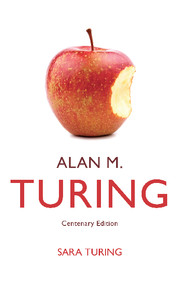Book contents
- Frontmatter
- Contents
- Foreword to the Centenary Edition
- Preface to the First Edition
- Foreword to the First Edition
- Part One Mainly Biographical
- 1 Family Background
- 2 Childhood and Early Boyhood
- 3 At Sherborne School
- 4 At Cambridge
- 5 At the Graduate College, Princeton
- 6 Some Characteristics
- 7 War Work in the Foreign Office
- 8 At the National Physical Laboratory, Teddington
- 9 Work with the Manchester Automatic Digital Machine
- 10 Broadcasts and Intelligent Machinery
- 11 Morphogenesis
- 12 Relaxation
- 13 Last Days and Some Tributes
- Part Two Concerning Computing Machinery and Morphogenesis
- My Brother Alan
- Bibliography
2 - Childhood and Early Boyhood
Published online by Cambridge University Press: 05 April 2012
- Frontmatter
- Contents
- Foreword to the Centenary Edition
- Preface to the First Edition
- Foreword to the First Edition
- Part One Mainly Biographical
- 1 Family Background
- 2 Childhood and Early Boyhood
- 3 At Sherborne School
- 4 At Cambridge
- 5 At the Graduate College, Princeton
- 6 Some Characteristics
- 7 War Work in the Foreign Office
- 8 At the National Physical Laboratory, Teddington
- 9 Work with the Manchester Automatic Digital Machine
- 10 Broadcasts and Intelligent Machinery
- 11 Morphogenesis
- 12 Relaxation
- 13 Last Days and Some Tributes
- Part Two Concerning Computing Machinery and Morphogenesis
- My Brother Alan
- Bibliography
Summary
Shortly after our marriage my husband and I returned to the Madras Presidency. Our elder son, John Ferrier, was born at my parents' home in Coonoor, Nilgiris, 1st September, 1908. Nearly four years later our second son, Alan Mathison, was born at Warrington Lodge, Warrington Crescent, Maida Vale, London, on 23rd June, 1912. His christening took place at St. Saviour's Church, Warrington Avenue, on 7th July, 1912. We spent the following winter with our boys in Italy. My husband returned to India in the spring of 1913, while I followed in September, leaving both children at home with Colonel and Mrs. Ward at St. Leonards-on-Sea. Both boys grew very much attached to “Grannie” as they called Mrs. Ward. It had been intended to take Alan out to India, but owing to his having slight ricketts it was thought better to leave him in England. Despite his delicacy he was an extremely vivacious and forthcoming small child.
My letters to my husband when I was in England in the spring and summer of 1915, round about Alan's third birthday, give some idea of what he was like. I was not alone in my opinion when I wrote, “a very clever child, I should say, with a wonderful memory for new words,” for I reported that his uncle, Herbert Trustram Eve, maintained that he would do great things – this when Alan was nearly three. Here are extracts from letters at this time: “Alan generally speaks remarkably correctly and well. He has rather a delightful phrase, ‘for so many morrows,’ which we think means, ‘for a long time,’ and is used with reference to past or future.”
- Type
- Chapter
- Information
- Alan M. TuringCentenary Edition, pp. 9 - 23Publisher: Cambridge University PressPrint publication year: 2012



